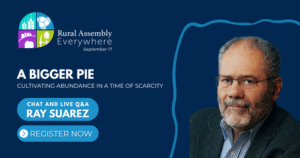Stephen Gong on Asian American visibility
Stephen Gong and his team at the Center for Asian American Media are in the midst of celebration. For the first time since 2019, The Center’s annual film festival, CAAMFest, is back fully in person.
The festival features more than 50 programs over 11 days (May 11-21), including narrative, documentary, shorts, features, panels, that celebrate Asian American storytelling through film, music and food programming.
“But even as we celebrate Asian American storytelling, our communities (and our nation) continues to struggle with anti-Asian hate, gun violence, and under-addressed mental health issues,” Gong said.
Gong is the Executive Director of the Center, a nonprofit organization dedicated to presenting stories that convey the richness and diversity of Asian American experiences to the broadest audience possible. He is also a strong supporter of rural America, serving as the Board Chair of the Center for Rural Strategies.
In 2021, we interviewed Gong on the Everywhere Radio podcast, where he talked about Asian American visibility, his connection to rural America, and his work in media.
“The invisibility of Asian Americans has not just been a case of mainstream America not wanting to recognize the history of Asians in America. It’s been a survival tactic for many, if not all, Asian American communities,” he told host Whitney Kimball Coe. Watch and read an except below and find the full episode here.
Asian Americans are in every part of the country ... Asian Americans cannot afford to be invisible anymore.
Stephen Gong
From Gong’s 2021 interview with Everywhere Radio:
“The invisibility of Asian Americans has not just been a case of mainstream America not wanting to recognize the history of Asians in America. It’s been a survival tactic for many, if not all, Asian American communities. Assimilation is difficult because we look different and don’t come from a European background. As a result, Asian Americans often focus their energy and resources within their own families or communities and keep a low profile. This invisibility has contributed to the current situation, where there have been thousands of anti-Asian hate crimes in the past year.
However, this past year has also seen a rise in the visibility of Asian Americans in the corporate world, particularly in the tech industries. Many have benefited from America’s ideals of meritocracy.
However, they now realize the fragility of their success and recognize that their own well-being is connected to that of other communities.
Asian Americans cannot afford to be invisible anymore.
They are not alone, and they must actively participate in America’s civic processes in order to find a way out of this situation.
This is where we stand at the moment.”







